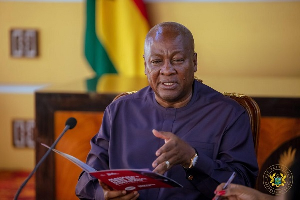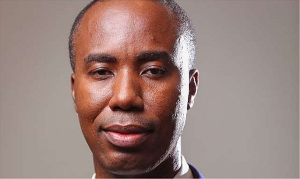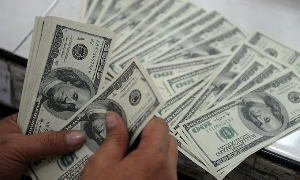Today, Tuesday, April 16, 2013 marks the 100th
day in office of President John Mahama. Many, as has become the convention, will be analyzing his performance the first hundred days of his tenure of office as President of Ghana.
Ordinarily, there should have been no need for anyone to make fetish out of the President’s first 100 days in office. However, these first hundred days has come to mean a lot for politicians and the media particularly in their bid to score political points. But to really understand the essence of the first hundred days of a President in office and to determine whether President Mahama’s has been a success or otherwise, it is important to examine the origins of the concept of the first hundred days of the term of office of a President and how to determine his success during these days or otherwise.
According to Kenneth T. Walsh, the first 100 days measure is ‘not a perfect measure, but it is a useful one – the 100 day standard for gauging Presidential effectiveness.’
He then goes on to state why there is the need to gauge a President’s First 100 days in office.
“The underlying truth is that Presidents tend to be most effective when they first take office, when their leadership style seems fresh and new, when the aura of victory is still powerful.”
In essence therefore, the first 100-days in office does not really indicate whether a President has succeeded or failed thus far or will succeed or fail in the final analysis. Kenneth Walsh says the importance of the first 100 days is the assurance or otherwise that the populace would derive from the style of leadership the new President.
He traces the origin of the concept of the first hundred days to the first hundred days in office of the 32nd President of the United States of America, Franklin D. Roosevelt (1933-1945).
“There is nothing magic about the number, and many presidential aides over the years have complained that it is an artificial yardstick. But it has been used by the public, the media, and scholars as a gauge of presidential success and activism since Franklin D. Roosevelt pioneered the 100-day concept when he took office in 1933. He was faced with the calamity of the Depression—and he moved with unprecedented dispatch to address the problem. "The first hundred days of the New Deal have served as a model for future presidents of bold leadership and executive-legislative harmony," writes Cambridge University historian Anthony Badger in FDR
In his first hundred days in office, which began March 4, 1933, Roosevelt spearheaded major legislation and issued a profusion of executive orders that instituted the New Deal—a variety of programs designed to produce relief (government jobs for the unemployed), recovery (economic growth), and reform (through regulation of Wall Street, banks and transportation). The economy improved rapidly from 1933 to 1937, but then relapsed into a deep recession.
It is worth noting, according to Kenneth Walsh, that during these 100 days, FDR “ began an unprecedented period of experimentation during which he tried different methods to ease the Depression; if they failed, he tried something else”.
This in essence means that failure to deliver in a certain policy or project during the hundred days does not mean failure on the part of the President. What is important here is for the President to show his leadership style, one that can be examined. In analyzing or critiquing President Mahama’s first hundred days in office therefore, the issue to examine is what leadership style or what new he has brought into government that can determine the success of the nation’s developmental agenda thereof.
This paper has identified the 5 top leadership style or management style that President Mahama has brought into office to spearhead national development. Here they are below;
1. MORE WOMEN IN GOVERNMENT
President Mahama did not promise any quota of appointments for women in his government. But it is significant to note that over 30% of his appointees so far are women. This is unprecedented in the history of the Fourth Republic of Ghana.
2. MANY MORE YOUNG PEOPLE IN GOVT
The large number of young people who have been appointed into Ministerial and Deputy Ministerial positions by President Mahama is also unprecedented. Perhaps, taking a leaf from the book of his predecessor, President Mahama has appointed lots of under- 40s into his government. In reality, he is building up the next generation of National leaders and statesmen.
3. SECURITY
Many keen observer of the security situation in Ghana will acknowledge the presence of police personnel in most parts of the big cities especially in Accra, Tema and Kumasi which records high crime rates. It is no wonder that the crime rate has dropped, according to the Police. Cases of armed robbery have by and large been dealt with by the police who move in quickly to apprehend these criminals. Improvement in policing is there a style that President Mahama isn’t take credit for,
4. RESOLUTE & CALM LEADERSHIP
In the aftermath of the General Elections in December 2012, the largest opposition party, the NPP, cried foul alleging the votes had been rigged. Comments of some of its leaders and the activities by some of its supporters, all threatened the security of the state. Many had butterflies in the stomachs as NPP activists attack innocent people including journalists. Demonstrations which could turn violent were organized. But, President John Mahama has to his credit contained the situation, lowering the political temperature and thereby assuring the international community once more that Ghana will not go the way of Rwanda, Liberia and Sierra Leone. It would remain the oasis in the desert. This is indeed a feather in his cap.
SCALING OVER THE ENERGY CRISIS
5. President Mahama was sworn into office amidst several crises, notably the energy, water and gas shortages. Every objective observer is aware these crises were not his creation as many would want Ghanaians to believe. The important thing is how he set about to tackling the criese. He explained how the crisis has come about to Ghanaians. He explained what is being done to alleviate the crises. Ghanaians saw him moving from one energy sector to the other – indeed, he was working for Ghanaians.
The result is that the energy crisis is nearing its end. The load-shedding (dum sor dum sor) is gradually giving way to constant power supply. Mahama is bringing to a permanent end an age-old problem that has plagued the country. The nation is not out of the woods yet with what the President has done within so short a period, there is cause to be optimistic about the future. Clearly, this is a President who is showing that he has not been voted into office to come and be a king (di wo hene). He has been voted to office to work, to solve problems and he is doing just that. This gives hope for the future.
Of course, the top five achievements cannot be the only hallmarks of President John Mahama’s first hundred days in office. But, as far as the ‘Daily Post’ is concerned, they are the most significant. With Ministers and Deputy Minister having just been sworn in, the Appropriation Bill having just been passed, boards yet to be put in place and CEO’s not appointed or confirmed yet, it will be the height of naivety for anyone to expect the government to point to a project or projects it has launched or commissioned as its achievement. Indeed, that, as described earlier, is not the essence of 100 days – the essence is the examining the kind of leadership style that the new President brings into office. President John Mahama’s own is clear – newness in everything, a resolute leadership with a clear vision of where he is going.
Opinions of Tuesday, 16 April 2013
Columnist: Dailypost














